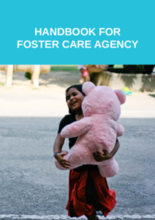This handbook was developed specifically to create a Foster Care Programme for unaccompanied and separated children (UASC) within the Rohingya community in Malaysia. Article 20 (Children deprived of family environment) and Article 22 (Refugee children) of the Convention on the Rights of the Child (CRC) require that special care arrangements and protection are provided for UASC while preserving their ethnicity, religion, culture and language. In the case of Rohingya UASC, this calls for a special Foster Care Programme where these children are placed under the care of families from the Rohingya refugee community.
Children from the Rohingya community account for the largest percentage of unaccompanied and separated children (UASC) among the refugees in Malaysia. In 2017, UNHCR reported a total of 764 UASC in Malaysia and out of these, 504 were Rohingya children. Refugee children in Malaysia lack the legal status to help protect them from a host of environmental and individual risk factors, which include the risk of abuse, exploitation and detention. For those who are in Malaysia without their parents or without any adult supervision, they are at an even greater risk. UASC need the care and protection of mature and responsible adults to ensure that other adults do not take advantage of their vulnerability and use them for illicit purposes.
The handbook recognises the significant challenges faced by the Rohingya community in Malaysia and therefore incorporates elements needed to help foster parents from the community meet the ideals of the programme. For instance, the programme requires elements such as training and development, foster parents support groups and assistance in providing resources or incentives to be put in place by the Foster Care Agency and other relevant stakeholders of the programme. The uniqueness in this approach means that, unlike usual foster care programmes where the foster parents are expected to demonstrate their capability and capacity to care for the foster child from the beginning, this programme provides the prospective Rohingya foster parents the necessary assistance to help them be suitably equipped to foster a child.
When implementing the programme, it is also important to provide adequate guidance and supervision to help foster parents adopt the standards of childcare that may not be the current cultural practices or skillsets within the Rohingya community. As cultural practices require time to change, necessary opportunities are needed and provided for the foster parents to develop and meet all the expectations of the role. Having experienced caseworkers who are reasonably aware of the childcare practices of the Rohingya community and are able to continuously engage with the community is critical for the success of the programme.
Finally, it is strongly recommended that the Foster Care Agency should approach the implementation of the programme by adopting the view that every community, when given the necessary tools, resources and opportunities, can reach all the ideals and standards of the programme. By adopting this position, the expectation is that the Foster Care Agency and other relevant stakeholders will be invested sufficiently over a reasonable period of time in order to meet the goals of the programme.
Related Content:

